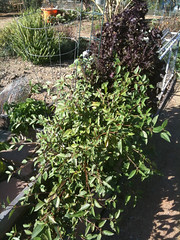Organic gardening can be an every day part of your life, but knowing about them and purchasing the proper equipment can be difficult. There are also many types of organic seeds to choose from. The following tips below will help you get started in growing an amazing organic garden.
The ideal temperature to set your thermostat for indoor plants is between 65-75 degrees Fahrenheit during the day. The temperature in order to effectively grow. If this is a little too warm for your house, another solution you can utilize is to purchase heat lamps for your organic plants.
Space is very important when planting an organic garden. You can underestimate how much space you need as they grow. Plan your garden carefully and leave enough space between seeds.
When maintaining your organic garden, lightly brush over them using your hand up to twice a day. This may sound strange, but there is research suggesting that it does promote plant growth relative to unpetted plants.
Gardening of any type can be a great hobby that helps you to feel more at one with the earth, but organic gardening takes it a step further by using earth-friendly methods.
By changing up varieties and locations, you will be able to ward off disease and fungus naturally.
The garlic are ready for harvesting when the very tops turn brown.
When you are buying seedlings for tomatoes, avoid the ones with a bad root system or green starts. These starts can stay on the tomato seedlings for a long time, which prevents the seedlings from growing until the starts are gone.
Botanical Insecticides
Research the local botanical insecticides which can be useful in ridding your garden of pests.These natural insecticides can often be more effective than their chemically engineered pesticides. However, botanical insecticides may not last as long because of their biological makeups, they often decay and disappear quickly.
You must be sure to mulch your garden or flowerbed using at least three inches of materials that are organic. This will help your garden by adding nourishment to the soil, holding in moisture levels, locking in moisture, and improving the overall appearance of the garden.
Using a soaker hose to water an organic garden is the best choice.
Think about what you can use on your garden. Try using natural and organic alternatives rather than common chemical fertilizers. A great example to use compost.
If you are planning to plant trees or shrubs in your yard, dig a hole as naturally as possible. If you create holes that have “glazed” sides created by shovels, it restricts the growth of the roots.
There are all kinds of plants that will grow well in an organic garden. Mulch is the friend of plants that require acidic conditions. You can mulch these plants with a very thick layer of beautiful pine needles every fall.
Acquiring a good understanding of organic gardening is necessary to grow all kinds of healthy fruits and vegetables. Using the above advice is a great starting point for a successful organic garden.

